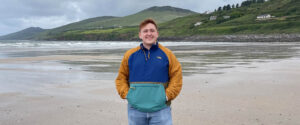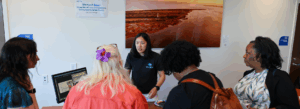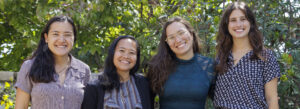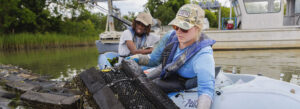Graduate Symposium 2020:
Learning to think outside and inside the box
The Graduate Symposium 2020 allowed early career graduate students to strengthen professional skills and expand their network in a supportive and dynamic setting. During the evening reception and poster session, Virginia Secretary of Education Atif Qarni challenged participants to build bridges between disciplines and enhance the Commonwealth’s emerging workforce.
“It’s really about working together in teams and all the different disciplines coming together, focusing on a specific project to make the world a better place,” Qarni said. “This is exactly what we’re trying to do in Virginia in the entire education continuum—from early childhood K-12 through community colleges and universities, to individuals like yourselves transitioning to careers.”
The poster session, where participants presented non-traditional posters of their work, was one of many “out of the box” components of the Graduate Symposium 2020, designed to strengthen the skillsets and networks of graduate students engaged in coastal and marine studies. The symposium, held Feb. 27-28 in Richmond, Virginia, also included 16 professional development workshops and panels, a keynote presentation on collaborative teamwork, and TED-inspired talks from VASG graduate research fellows
Keynote speaker Matthew Allar, an associate professor of theatre and scenographer at William & Mary, focused his address on the challenges shared by theatric production and interdisciplinary science. In both disciplines, many moving parts must come together at once, and the actors—whether in the performance arts or in scientific spheres—encounter a constantly shifting stage of opportunity, collaboration, and even goals.
“This idea that artists think outside the box is patently false,” Allar said. “Designers are literally trained to think inside the box. I spend all day working inside boxes, the boxes being theaters. But within that box are many complications that require creative thinking.”
Allar then led the attendees in small group teamwork challenge of building tabletop sculptures from odds and ends. Each group had to practice teamwork and flexibility as Allar added unexpected challenges during the exercise, like figuring out the youngest team member without speaking, or using only their non-dominant hands to build the sculpture.
Symposium participants explored opportunities for professional development during afternoon workshops and panels focusing on science communication, science education, and science policy. The two science education workshops gave practical examples of graduate research transformed into classroom activities, like dissecting play-dough fish stomachs filled with colorful beads, or graphing trends in water quality. Educational resources, like the marine science lessons on The Bridge website, give graduate students a chance to practice a unique style of science communication.
“If you can talk to a middle schooler about your science, you can talk to anyone about your science,” Education Specialist Lisa Lawrence said while discussing the lesson plans offered by the Marine Advisory Program at the Virginia Institute of Marine Science (VIMS).
“This idea that artists think outside the box is patently false,” Allar said. “Designers are literally trained to think inside the box. I spend all day working inside boxes, the boxes being theaters. But within that box are many complications that require creative thinking.”
Attendees learned how to market their STEM skills to employers, explored different career paths in science communication, and engaged with panelists about science policy, interdisciplinary teamwork, and innovative science.
During a panel on community-engaged research, three graduate students shared how they built relationships with the communities their research served, from helping make maps of critical infrastructure for rural county planners to developing salt-tolerant crops for farmers whose fields are vulnerable to sea level rise.
“Involving the younger generation is really important, too,” said Victoria Long, a former graduate research fellow and Ph.D. student at the University of Virginia. “Someday they’re going to face any challenges we’re not able to address in our own time.”
Long and nine other graduate research fellows competed in a TED-inspired talks that brought their lab and field work into a ballroom full of diverse natural and social scientists, educators, and practitioners. Topics ranged from non-native catfish—and how we should communicate about their spread in Virginia’s tributaries—to plankton food and the survival of Virginia’s coral, baby blue crabs, speckled trout, oysters, and cobia in future conditions.
Vaskar Nepal, a VIMS Ph.D. student at the and former VASG Graduate Research Fellow, won the judge’s choice award for his TED-inspired talk on blue catfish in the Chesapeake Bay, and current VASG Graduate Research Fellow Christina Fantasia-Buscher, a Ph.D. student at UVA, won the people’s choice award for her presentation that immersed the audience in the struggles of ocean acidification from the perspective of freshly hatched blue crabs.
Attendees were able to put these networking and science communication skills in practice during the career and graduate school fair. A networking breakfast and the evening poster session also gave participants an opportunity to practice communication. Old Dominion University Ph.D. student Jemelyn Baldisimo won first place for her poster on coral reef fish in the marine ornamental trade, and Ann Ropp, a VIMS master’s student, took second place for her research on hard clam genetics.
Graduate Symposium 2020 was made possible through the support of many generous sponsors willing to invest in the future professionals addressing coastal and marine challenges.
For more information about the Symposium program and sponsors, visit the website here.
Browse the Flickr Photo Gallery here.
The TED-inspired talks can be found on the VASG YouTube page.
Photos and video by Aileen Devlin | Virginia Sea Grant
Story by Madeleine Jepsen | Virginia Sea Grant
Published April 7, 2020.
The Graduate Symposium 2020 allowed early career graduate students to strengthen professional skills and expand their network in a supportive and dynamic setting.
Graduate research fellows competed in a TED-inspired talks that brought their lab and field work into a ballroom full of diverse natural and social scientists, educators, and practitioners.





